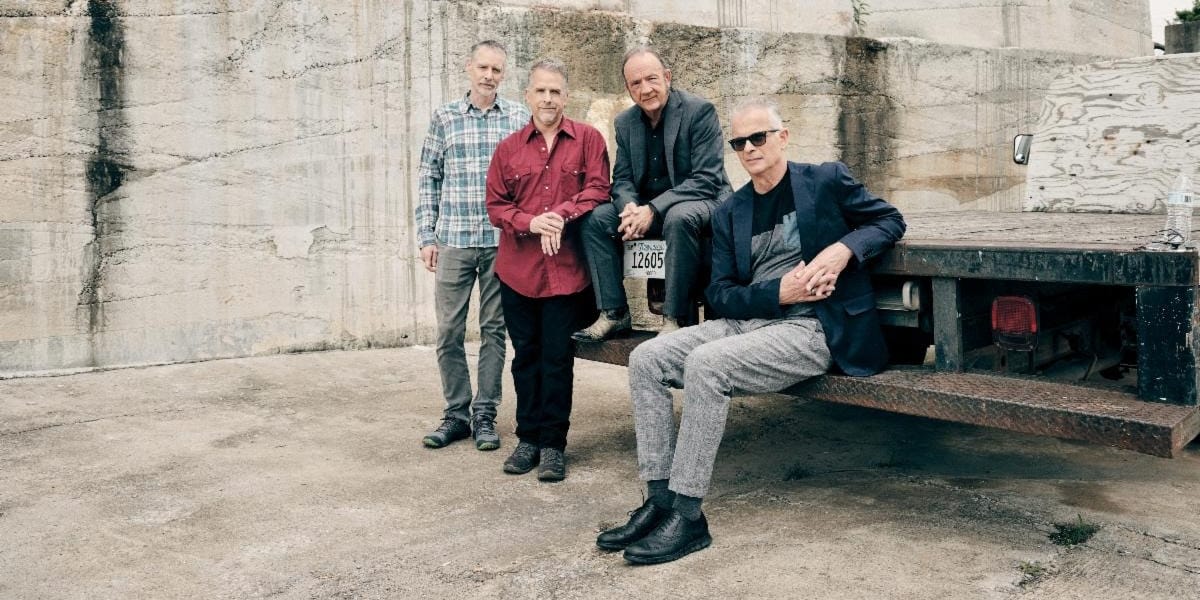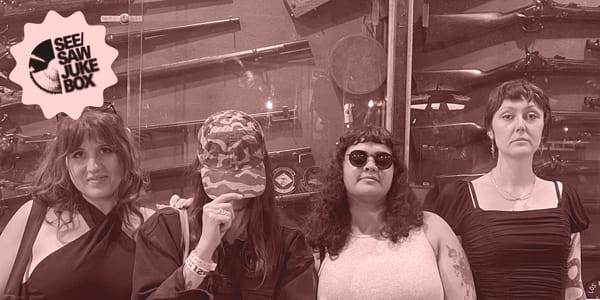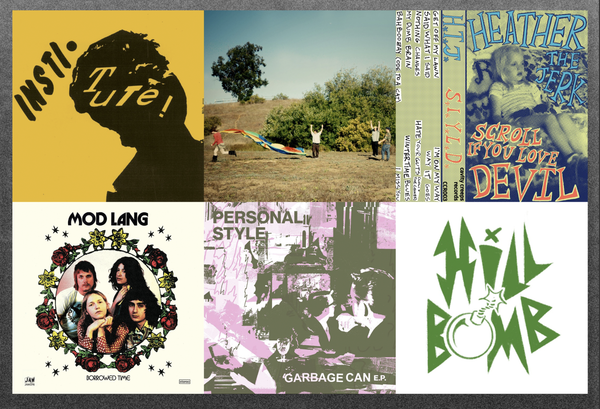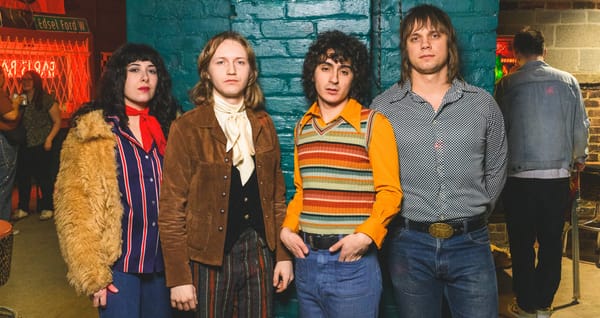the jesus lizard have nothing to prove to you
Duane Denison discusses bringing the band back from the dead and how honoring their legacy meant completely ignoring it.

In traditional horror movies, omission is the default means of ratcheting up tension. Eldritch figures exist largely outside of view, coming into frame in flashes and jump-scares, but never captured straight-on with the camera’s lens. The Jesus Lizard have always taken the opposite approach: shoving the uncomfortable, writhing horrors in your face until either you flinched or bit your lip and embraced it.
Ever since their formation, in earnest, as a four-piece rock band on 1990’s Head, the band’s creative core, vocalist David Yow, guitarist Duane Denison, bassist David Wm. Sims, and drummer Mac McNeilly spent years giving listeners the audio equivalent of exposure therapy. McNeilly’s drums filled the room’s open space so thoroughly, the note’s decay became just as important as its attack. Sims’ bass lines hung down like rusted razor wire at a junkyard, swooping down and ready to catch flesh when you least expect it. For his part, Denison ignored the stompbox distortion tones running rampant and played heavy, aluminum-neck guitars through bright, slightly overdriven Hiwatt amps, crafting the most sinister clean tone ever committed to tape. And Yow? If he wasn’t screaming in your face, it probably meant you left as soon as you caught the first glimpse of his balls, ass, or both.
On September 13, for the first time in 26 years, and 28 years since McNeilly was on drums, the Jesus Lizard have made a new record. It’s called Rack, fitting right in with the band’s classic monosyllabic, four-letter album titles. It’s been a long road, as the band chipped away at writing, demoing, re-demoing, and recording over the course of many years since their original reunion—or, as Yow prefers, “reenactments”–in 2009. In that time they released a career-spanning retrospective book called, you guessed it, Book, and after some brief hiatuses, have been playing shows regularly since 2017. But through it all, the likelihood of new music from the Jesus Lizard seemed highly unlikely.
Contesting with a legacy built on chaotic, unpredictable live shows and records that sound as vital now as they did 30 years ago, the Jesus Lizard should have something to prove with Rack, but they most certainly don’t. Where the final two albums from their original run, 1996’s Shot and 1998’s McNeilly-less Blue, were divisive deviations released on major labels, recorded by real producers (not just the spartan-like engineer Steve Albini), and featured a myriad of studio flourishes, Rack neither runs from those sounds nor embraces them. In pure fact, nothing on Rack sounds like it could have been on Goat, but none of it sounds like it could have been on Blue either. It sounds like Rack, and it sounds like the Jesus Lizard in the present day. While many fans clutched the Jesus Lizard close to their chest, holding it so tight they believed it to be theirs, it always truly belonged to Yow, Denison, Sims, and McNeilly. With Rack, they prove exactly that. We’re all better off for it.
Talking to Denison, it became clear the reverence the members hold for the project is still there. And they believe in Rack just as much as they have any other Jesus Lizard album—past, present, or future.
In Book, you said that being in the Jesus Lizard was the most defining piece of your life. Even as you remained active in other bands, did it always feel like the Jesus Lizard was still in you?
Duane Denison: Yes, absolutely. It seems like no matter what else I did, more people knew me from the Jesus Lizard than anything else. For instance, I have the band Tomahawk with Mike Patton and I think we did five albums. The first two especially, they sold a lot more than any Jesus Lizard album ever did, but it just didn’t get the critical respect or the recognition from fans that the Jesus Lizard had. That stands to this day. I’d go tour with other groups and I’d just casually look around the room and sometimes you’re in a backstage area and you see band photos stuck to the wall and it’s like, there’s the Jesus Lizard. It almost seemed like everywhere I went we’d already been there. We did a lot of press and a lot of interviews and all that so yeah, to this day, chances are if somebody knows who I am, that’s why.
To that end, was there ever a point where you started to resent that fact and revolted against it?
No, I never felt like I had to make a conscious decision to step away from that. I just kind of did that naturally. Even while I was in the Jesus Lizard, I had that side-project the Denison/Kimball Trio, which was this jazzy sort of thing, not terribly different from what the Messthetics are doing now, really. I could always step away from that easily enough, I never had to make a conscious effort to do that. I sort of felt with other projects it was a chance to step into a new role. I wasn’t worried about—what some people might say—“redefining myself.” Because, to me, that’s something a big star like David Bowie does. The rest of us just sort of adapt and keep going.
Given that you’ve remained active in other projects, when did you start feeling the desire to put your creative energy back into the Jesus Lizard?
I go through periods where I write a lot and then I step off and let the ideas sort of build up, and then I write a lot again. I’ve always got something going on, and there’s always some unfinished piece that I’m working on. I don’t really worry about categorizing it. I don’t worry about which band it's for or who's going to work on it, I just write what I’m feeling at the moment and then set it aside. Sometimes I’ll record it, sometimes I’ll just write it out with a temporary title, and I keep a list of new things. This album’s not even officially out yet and I’ve already got probably a half a dozen new things I’m working on. I’ve always been like this. I just keep writing new stuff as it comes up and then set it aside. Then you’ve got this nice little backlog of things that you can adapt for certain situations.
Going back through Book, David Wm. Sims talks about his process of writing where he’d just play along with someone else’s song and then adapt that feeling into a song idea for the Jesus Lizard. What does that spark of creative inspiration look like for you?
For me, I just noodle around. Sometimes I start with an idea in mind, like I want to come up with something that’s fast and agitated or something that’s choppy and aggressive or maybe I want something that’s more smooth and continuous, and then I just start noodling around until something shows up. To me, you know you’ve got something when you come back to it a day or so later and you still remember it. It’s a strong enough idea that it pulls you back. I get ideas throughout the day, and almost every time I play if I’m being honest, but a lot of them are…I wouldn’t say they’re not worth pursuing, they’re just not any more interesting than a number of things I’ve already done. I think everyone everywhere reaches their own personal level of mediocrity in everything, in everything you do. For me, in music, you have to try to find those things that are better than mediocre. I have to be trying to say something and have it feel like the best one yet.
But also, I get ideas from outside sources. I’m a firm believer that fresh input equals fresh output. I don’t play along with other people’s records and stuff, I don’t do that, but I’ll play along with recordings where I’m just improvising. I have a degree in music, I can read music pretty well, so I can go out and buy workbooks and sheet music and find ideas that I then adapt for my own purposes. I try not to copy other people’s stuff but if you take an idea that’s out there and play it backwards, flip it over, try to invert the intervals, play it twice as fast, play it half as fast, then it usually spins into something else entirely.
It seems like David Yow was somewhat resistant to the idea of making a record but then came around to it. I also have read him saying he was opposed to the initial reunion, to the release of Book, and now this. What made the rest of you keep pushing these issues? Was there a point where you felt like you’d just acquiesce and nothing would have happened?
Well, it’s funny. David will be resistant to things but then, once they get going, he can’t stop being enthusiastic. Right now, he’s telling everyone about the album and he can’t stop talking about it. He’s going crazy designing T-shirts and working on video stuff so, suddenly… I think it’s a pose. I think he plays difficult because, well, I don’t know why. [Laughs] I think it’s a pose.
When we got back together in ‘09 and started playing shows together, it just went really well. We still get along, and we still sound good together. In some ways, I think we sound better than we did in the old days because maybe there’s a little more maturity and a little less intoxication involved—I’m not kidding. One of the consistent bits of feedback I got from people was, “I knew you guys would be good but I didn’t think you’d be that good.” And that made me very happy, so when we started doing songs, I felt very strongly that this was good material. I was saying, “I know this, David. Listen close to it.” Then finally he agreed to work on it. And I wanted people’s feedback on the album to be the same as the shows, where people said, “I knew it would be good, but I didn’t think it would be that good.” And I’m starting to hear some of that, so it’s very gratifying.
And also, I don’t know, but I think the time is right. I think people want a release. People want some relief from this endless news cycle of our dystopian future. I think some mindless rock music—well, it’s not totally mindless now, is it? I think David’s lyrics are very thoughtful, and the music is very thoughtful, but it comes off as very unhinged at times, and that’s fine. It’s rock‘n’roll, you’re supposed to lose your mind with it and have fun with it. I think people really want that right now. And when I look around, frankly, at what other bands are doing, there’s not too many others that are giving it that. So here we are.
Knowing that you didn’t want to repeat yourself, but had a weighty history to contend with, how did you all approach honoring what the band was without feeling boxed in by that legacy?
Some of the material on this album hints at our past body of work and that was almost intentional. We didn’t set out to do that but, as it evolved, some of the pieces clearly did have a certain imprint from our previous songs and that’s okay. That was the point of departure, but it doesn’t stay there. This album, there’s only a couple things that really sound like it’s from the past. The rest of it is sort of a new, revamped version of us. Then there’s a couple things that don’t sound anything like what we did before.
I also felt like, with starting the band over, to pretend like we’re reinventing ourselves, that would be a mistake, too. I think when a band is really good, it’s because they’re good at a certain thing or a certain few things and they own that. I think with our band, we did. We had a couple different things that we tended to do, I’d say two or three things. We had the fast one, the slow one, and the weird middle one. [Laughs] That’s the Jesus Lizard. There’s plenty of that on this album. It would have been a mistake to disavow the past, but it would have been a bigger mistake to just try to recreate it.
There’s the song “Lord Godiva”—I saw some record of that song dating back ‘97 before the band’s breakup. What made you want to bring that one back from the archives?
That’s one where there’s demos of it that exist from the ‘90s but it was never quite finished until the last couple of years. It just held up. That really grinding riff, the lyrics are just unhinged nonsense, but it just held up and made the cut. Every time you go into the studio you record a bunch of songs and there’s some that get kept and a couple that get tossed, and that one got kept.
There’s actually another one that goes back, oh Christ… [mouths riff, sings melody] “Falling Down.” There’s actually a rough demo of that also from the late ‘90s, but we just never finished it. It’s funny, the other guys didn’t even remember demoing it. It was late-period, and I think Mac didn’t even play drums on those demos, he was gone by then, so some of this stuff even goes all the way back to then, but it still holds up. But I think we added a lot of new things, which creates a nice balance of material.
Talking about the things that stick, I know it was a slow process of writing and recording the record. Was there a point where that passage of time gave any of you pause about the material or did it just reaffirm your commitment to it?
There were definitely times because, I mean, it took several years for this to come together. We would have these Zoom meetings, because we all live in different cities, and these Zoom meetings were almost like business meetings where you try to get a status report on each of the different songs. We would just kick things along like that.
When we were a band in the ‘90s, we were all not just in the same town, we were in the same building. All four of us were living in a three-room apartment. We’d go on tour and then come home and we were all still together. We were around each other, god, 24 hours a day for several years. I’m glad we don’t have to do that anymore, but we stay in touch. We send files, we have Zoom meetings, then we get together here in Nashville to rehearse, and everybody stays at my house, just like the old days.
There are times, I have to admit, where it was turning into a lot more of a commitment than I thought it would be. It was taking too long and wearing me out. But I have to give credit to the producer Paul Allen who actually worked on the demos with us with a mobile recording unit. He was giving encouragement every step of the way, telling us that we had to do it. He was like, “If you don’t do this, you’ll regret it the rest of your life, so come on.” He pushed it across the goal line.
By the time we went to record the album, we’d demoed these songs twice. Having that time to really listen is when we get to experiment. That’s when we get to decide if it works or not. By the time we went into the studio, we pretty much knew exactly what we wanted to do. There was a little bit of guitar exploration here and there just because I could, and there are always some things you discover along the way but, in a lot of ways, a lot of the guesswork had been worked out. You try things and then you live with it for a few months and you can see if it grows on you or if you grow to dislike it. You record something very spur-of-the-moment and it seems like a great idea at the time but then a couple weeks later you wish you hadn’t done that.
We’re talking on Steve Albini’s birthday, who engineered a good chunk of the early Jesus Lizard material. Not to be morbid, but having that original core of the band back together, did it feel important to make a potential final statement from this group of people?
As soon as we were playing together back in 2009, and we’ve done several short things since then, as soon as we started doing that again, it just seemed like that’s what we’re supposed to be doing.
I wouldn’t say it was there obviously but yes, the question of mortality hangs over every song and in everything we do. As we get older, more and more people are disappearing so you’ve got to make it count. That’s why we took this seriously. On one hand, there are songs that are unhinged, fun, and crazy. But on the other hand, we were very serious because who knows, it might be the last thing any of us ever do. So absolutely, that hangs over things.
see/saw is a reader-supported publication. If you enjoyed this article, please consider a subscription to support this independent punk journalism operation.




